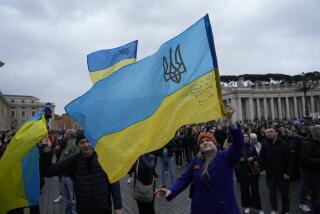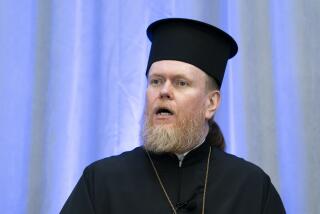Ukraine Prelate in Emotional Return to His Homeland
LVOV, Soviet Union — A frail Catholic cardinal returned here to the Ukraine from half a century’s exile Saturday, triggering a massive outburst of civic affection for a restored religion--and sought-after nationhood.
As his chartered flight from Rome flew over a flat, chill and tentatively green land he had last seen in 1938, Cardinal Myroslav Lubachivsky told reporters that for him this day--which his long-suppressed Ukrainian Catholic Church celebrates as Lazarus Saturday--is no different this year from any other.
“I feel the same as I do every day. I’m glad to be going home, but I’m not excited. I’m too old to become excited,” said Lubachivsky, who tells people he is 77 but, in fact, will still be 76 for another few months.
With a band tooting furiously and local clergymen and dignitaries clustering anxiously, Lubachivsky descended the rear stairway of an Aeroflot jet at the airport here on a cold spring afternoon. His step was tranquil, his features impassive.
With patriarchal deliberation, he knelt in his red-piped black robe to kiss the ground.
When Lubachivsky recovered his feet, he was crying like a baby.
Emotion spilled, too, from the large crowds that marked the route of his motorcade as Lubachivsky, the major archbishop of Lvov, belatedly rode to the cathedral where he was ordained a priest 52 years ago.
The streets of dowdy Lvov were forests of blue-and-yellow Ukrainian flags, with nary a red Soviet banner showing through. Muffled against the cold, men and women waved and wept.
They shook welcoming sprigs of pussy willow in anticipation of today’s Palm Sunday celebrations. Lubachivsky’s church is united with Rome but practices an Eastern rite and keeps its own liturgical calendar. Easter comes next week to Lvov.
“Slava! Slava!” people chanted. “Glory! Glory!”
“The page of history is turned. A new era is beginning,” proclaimed Lubachivsky in an airport address few heard in the jubilant crush. “The bitter years of our Golgotha--the martyrdom of blood--have passed. And now comes the time of the martyrdom of life, of rebirth and resurrection.”
Said the Lvov region’s elected governor, Vyacheslav Chornovil, a former political prisoner: “History has its laws that cannot be broken, which cannot be stopped, neither by a diabolical ideology nor by military might. What had to happen, happened. The head of the Ukrainian Catholic Church has returned home.”
The Ukrainian Catholic Church has the allegiance of about 10% of the 50 million people in this Texas-sized Soviet republic, but it is the dominant religion in Lvov and the adjoining areas of the western Ukraine.
From 1946 until last year, the church was officially proscribed, its bishops and priests often jailed, its property confiscated, its followers harassed into practicing their faith clandestinely.
“Today is God’s reward to us for half a century of suffering,” said Yaroslav Chukhnij, one of the welcoming priests.
Said Lubachivsky: “Let us take up the task of the rebuilding of the temple of souls of the Ukrainian people.
“No power on Earth can extirpate from our hearts this ancestral faith of ours, and this true Christian love,” Lubachivsky told massed well-wishers at Lvov’s Cathedral of St. George.
His return, like the rebirth of his church, makes Lubachivsky a key figure in the Ukrainian flux this uncertain spring. Both the regional governor and the mayor of this city of more than 760,000 people call for independence of the Ukraine, a breadbasket republic of critical economic importance to the Soviet Union.
Lubachivsky says he has no politics. Nevertheless, he has become a symbol of the constancy and the comeback victory of a church that is now closely associated with Ukrainian nationalism in an increasingly independence-minded republic.
“Many of the concerns of the church parallel the demands of Ukrainian nationalist revival. Among them are calls for respect for civil rights, cultural development and political self-determination,” said Borys Gudziak, an associate of the Ukrainian Research Institute at Harvard University who was in Lvov for Lubachivsky’s return.
In the rough-hewn crowd that came in its Sunday best to greet the returning archbishop Saturday, spontaneity humbled history and politics. It was simply a happy day in Lvov.
More to Read
Sign up for Essential California
The most important California stories and recommendations in your inbox every morning.
You may occasionally receive promotional content from the Los Angeles Times.










